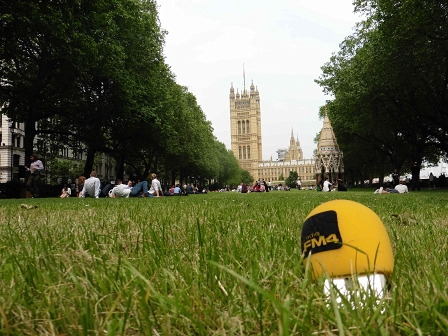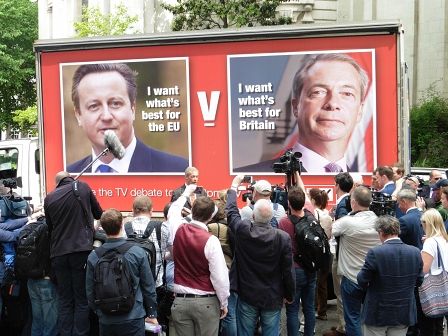Erstellt am: 18. 6. 2016 - 14:06 Uhr
Is the Genie out of the Bottle?
FM4 Reality Check
Hear the programme in the FM4 Player or subscribe to the podcast and get the whole programme after the show
As I cycled recently through the pancake flat landscape of the Fens in Eastern England I was taken aback by the giant banners that I saw as I pedalled into the villages. "LEAVE!", they screamed, rather inhospitably, "We want our country back."
The fluttering Union Jacks, flown to mark celebrations of the Queen’s 90th birthday, gave the impression that I had entered the last bastion of a resistance force against foreign occupation.
I hadn’t, of course. This is referendum time. In just a few days’ time, my home country Britain will make a fateful decision - will it remain a member of the European Union or will it decide to go it alone. And, according to polls, it looks every bit as tight as the recent Austrian elections. As political scientist Michael Keating told Reality Check this week "it’s on a knife-edge".

Chris Cummins
This has been a debate that has split the country and has led to an atmosphere that has been described by British commentators as "poisonous". It sometimes seems that all other questions of policy have been shelved while the country battles this out. Which to some degree I find baffling.
Cameron is struggling
Brexit
Diese Woche auch Thema auf meins.orf.at
As our London correspondent Olly Barratt explained to me when I met him at his office near Lord’s cricket ground, Conservative Prime Minister David Cameron, who called the referendum, will probably struggle to survive the referendum. If the Remain camp he represents wins, a wing of his own party is likely to try and organize a leadership coup. Tory backbencher Andrew Bridgen has claimed 50 MPs would be ready to move against Cameron who he has described as "at odds with half our parliamentary party and probably 70% of our members and activist base." If Leave wins it is hard to see how he will survive.
It is a crisis for the ruling party and it comes at a time when it should be enjoying plain sailing. The opposition is weak, the British economy is reasonably healthy and, even if EU migration has been significant since 2004, most economists say this has benefited the economy and therefore, logically, the pockets of ordinary voters. The London School of Economics researchers I spoke to said evidence of wage deflation caused by migration was negligible.
Indeed, if the referendum was being decided by rational economic data and voters were heeding the best advice on future prosperity or job security, the contest would be less even. According to Iain Begg of the European Institute at the London School of Economics most serious estimates suggest that Britain will lose economically from leaving the EU while only a "few mavericks" economists believing the country could benefit from going it alone.
So what is this all about? I’ve been travelling around Britain for this Saturday’s Reality Check Special - a preview of the so-called Brexit referendum, posing that question to many people as possible.

Chris Cummins
Is it about xenophobia?
At Smith’s Place in London, a short walk from the Houses of Parliament, I watched Ukip leader Nigel Farage defending accusations that he was demonising migrants. He had made comments which had been interpreted as suggesting that migration was causing a heightened likelihood of sexual attacks on British women. "I’m just saying it’s an issue", he said. Peter Whittle, the politician who had run as Ukip’s candidate for the office of London, insisted that Ukip was not racist, but was itself being demonized by the political mainstream for speaking up for "the concerns of ordinary people."
And these do include migration. In the village of Elton in Cambridgeshire, local businessman Derek Harris complained that "every train I travel on is full, every doctor’s surgery is full, every road I drive on is full, every primary school is full. We are full up." He says it is not about xenophobia but about the pragmatic politics of infrastructure capacity.
New statistics last week showed net migration to the UK in 2015 rose to a near-record 333,000, of whom 184,000 came from the EU.
Michael Crick, the political correspondent for British Channel 4 television, says "It would be very unfair to typify the Leave campaign as purely xenophobic. There are highly intelligent people running the campaign. Boris Johnson and Michael Gove are two the most brightest people in politics. They believe we will only be prosperous if we leave the European Union."
But in London, international development consultant Alex Wright told me he felt that the problems of national governance were being blamed on European politicians. Basically, he said, Brussels was being used a scapegoat for policy actually made in Westminster.
"I think the Leave campaign is appealing to base instincts," says Wright.
Murder of Jo Cox
On my trip I heard many different opinions, sometimes expressed with passion, often expressed thoughtfully on a big decision about national identity and sovereignty - questions that inevitably appeal to the heart as well as the head. That’s democracy. But for FM4’s Robert Rotifer, who I met for a chat at a pub near St Pancras station, there was a worrying element to this whole debate. "I think the climate in British society has changed because of this. It doesn’t matter how it ends up. There’s been a rise in petty nationalism."
A few days after Robert said this to me, the Labour pro-Remain politician Jo Cox was murdered by a man who reportedly shouted "Britain first." Had the atmosphere Robert mentioned contributed to this brutal act by an apparently mentally unstable man? I am wary of hysteria in the wake of tragedies but there is a debate to be had - by others. The New Statesman newspaper pointed out that politicians can’t create imagery that suggests a country is at "breaking point" and then not expect some madman to take the message literally.
But, perhaps Robert is right, the scaremongering on both sides has perhaps let a very unpleasant genie out of the bottle. I would like to dedicate the show to Jo Cox, who was the sort of politician Europe has been calling out for: a down-to-earth, straight-talking, humane, brave woman who in her short career in the British parliament emphasised togetherness above differences.



